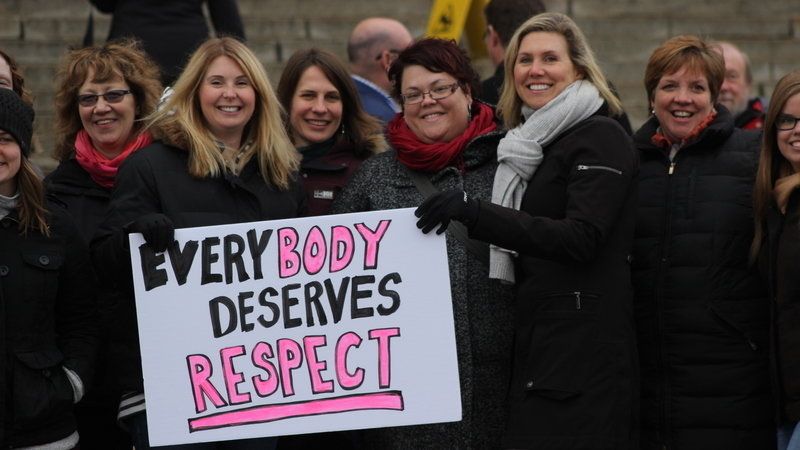Punchlines, Politics and Progress: The Fight to End Weight Discrimination

As we face another uncertain year, and struggle with challenges to our personal and collective physical and mental health, a long fight for dignity is taking an important turn in Massachusetts.
Massachusetts Bills S.1127 and H.1822 seek to ban discrimination based on body size. If passed, Massachusetts would become the second state with such protections in place.
Advocates argue that weight stigma, fatphobia and body politics are social justice issues. This movement, which originally gained support amidst the equal rights movements of the 1960’s, has grown in momentum. Though opposition certainly exists, a 2015 study showed that 78% of Americans support anti-discrimination laws for body size, as reported by the Harvard Strategic Training Initiative for the Prevention of Eating Disorders (STRIPED).
Rachel Plummer is affiliated with STRIPED and is a recent graduate of the Harvard T. H. Chan School of Public Health. She spoke on the history and significance of the bills, first introduced by former Representative Byron Rushing in 2009.
“He introduced the bill five times, with no success. After Rep. Rushing left office, Senator Rebecca Rausch and Representative Tram Nguyen picked up leadership on the bill last year. It got a lot of positive feedback, but with the COVID-19 pandemic, it was unfortunately not prioritized. This year there is a lot of support from the community for the bill, and we are really hoping it will be passed this session.”
While discussions of diversity, equality and inclusivity thrive in professional, social and legislative settings, weight stigma survives. Fat jokes continue. Stereotypes persist. And discrimination exists. But where is the outrage?
Plummer comments, “It comes down to a matter of social justice and public health equity. Weight discrimination is a widespread issue in the United States. One estimate states as much as 42% of people in larger bodies have experienced weight discrimination. More than 95% of people in the U.S. live in an area where they have no legal protection whatsoever against body size discrimination. We see this type of discrimination showing up in so many different settings: employment, housing, lending practices, education, you name it. For example, we see people in larger bodies, especially women, receiving lower wages for the same work as thinner counterparts.”
Plummer went on to explain the broader scope of body size/weight discrimination.
“The harms of weight discrimination can compound the harms of other forms of discrimination and oppression like racism, so it’s an intersectional issue as well. We see disparities in hiring and promotion, admissions to graduate programs—it’s a very widespread issue. We also know that weight discrimination and weight stigma take a toll on an individual’s health and mental health. Experiencing weight discrimination is linked to depression, anxiety, poor body image, eating disorder symptoms, heart disease, high blood pressure, and other health and mental health conditions.”
Currently, only one state, Michigan, has weight discrimination laws in place. Six municipalities have also addressed the issue: San Francisco, CA; Santa Cruz, CA; Washington DC; Urbana, IL; Binghamton, NY; and Madison, WI. These municipal codes and laws all vary in language and focus. Some use the terms “height and weight”, while others address “physical appearance.” In Washington state, the definition of disability was adjusted to include those living with obesity (a word that many activists feel is obsolete and offensive).
These measures are certainly encouraging, but, in an era that claims to be “woke”, “inclusive” and “progressive”, why do we not have more protections in place for people living in large bodies?
Plummer comments, “I think a lot of times, we hear people talking about the purported health consequences of higher weights. But not as many people are familiar with research on weight stigma and discrimination showing that weight discrimination (rather than the weight itself) accounts for a lot of those health effects.”
A 2020 study “demonstrated links between weight stigma and adverse health behaviors and indices that contribute to poor weight-related health, such as maladaptive eating behaviors, low physical activity, physiological stress, and weight gain.”
Plummer adds, “And not only that, but regardless of the health effects higher weights may or may not cause, no one should be discriminated against. No one should receive worse care from their doctors because of their weight. No one should be rejected from a job because of their weight.”
Rachel Estapa is the creator of More to Love Yoga. She is also a professional wellness educator, entrepreneur, and advocate. In November 2021, she provided testimony to the Massachusetts Joint Committee on the Judiciary on the weight discrimination bills. It was an experience she describes as, “Surreal, at first. It feels validating, scary, exciting, frustrating—and most of all, I’m proud that my voice can help add depth and color to this important (and personally important) issue for our greater public.”
Estapa has experienced the effects of bodyshaming and weight stigma since a young age.
“Early in life, my picture of self included the belief that weight-loss was salvation. I was first put on a diet at age six when a concerned doctor thought five extra pounds from the BMI (Body Mass Index) average wasn’t good. Throughout my childhood, teen, and early adult years, my mission was clear: lose weight and be worthy.”
Estapa’s story of the effects of weight stigma on young people is supported by research.
STRIPED cites “a study of K-12 teachers’ perceptions of students’ academic ability and willingness to work hard, teachers perceived students labeled overweight or obese more poorly, compared to thinner peers despite comparable objective tests of academic performance.”
Estapa reflected on the impact that the proposed legislative measures would have on people of all sizes.
“Weight stigma affects everyone, but larger people bear the brunt. We endure a constant barrage of messages and behaviors that proclaim something is wrong with us.”
She adds, “Passing this bill sends a strong signal in acknowledging how harmful weight-bias is. Weight shame robs people of dignity. This bill recognizes that people in larger bodies are a valuable part of society. It takes courage to be yourself, and any way to soften the blow is an honorable thing to support.”
Plummer is realistic, but hopeful, about the future.
“These bills will not solve the pervasive issue of weight discrimination. There is so much work that needs to be done. But we hope they will be a step in the right direction towards reducing this injustice, a step towards living in a world where people are treated equally, given equal opportunities, and treated with dignity and respect regardless of body size.”
Featured Image from a protest against size and appearance based discrimination




